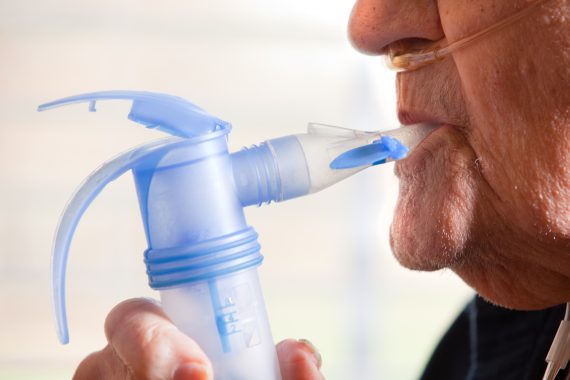NHSE: GP practices to ‘urgently restore’ spirometry despite BMA guidance

New guidance commissioned by an NHS England task group has said that GP practices should restore spirometry services ‘as a matter of urgency’, against BMA advice.
In March, the BMA told Pulse that GPs can refer patients requiring spirometry for an asthma diagnosis to secondary care in order to achieve QOF points when activity restarted in April.
But today, new guidance from the Association for Respiratory Technology and Physiology (ARTP) and the Primary Care Respiratory Society (PCRS) – developed by an NHS England ‘task and finish group’ – was sent to GP practices as part of NHS England’s regular GP bulletin.
The guidance said that as we enter a ‘potentially more stable period’, practices should begin to restore spirometry ‘as a matter of urgency’ and a ‘priority’, with a ‘clear assignment of responsibility for ensuring this happens’.
It said: ‘Regrettably due to Covid, provision of spirometry in primary/community settings has greatly reduced or ceased. This needs to be addressed with a matter of urgency to limit patient harm, whilst taking opportunities learnt from Covid to deliver better care.’
The guidance acknowledged that infection prevention and control (IPC) measures are ‘a major issue’ but said it is ‘not the position’ of the group to make recommendations on it.
However, it added that practices must risk-assess the process and ensure ‘all aspects are safe’ for both patients and staff before doing the procedure.
It said: ‘Due consideration needs to be given to: room air changes, the choice of personal protective equipment (PPE), cleaning of room and equipment, the opportunities to reduce risk by considering vaccination status of staff and patients and the use of lateral flow tests.
‘Local IPC advice on these measures must be obtained.’
Although spirometry is ‘not considered to be an aerosol-generating procedure’ (AGP), studies have found that ‘spirometry-associated cough’ – which occurs in a ‘significant proportion of patients’ – poses a ‘risk’, the guidance said.
It added that:
- Practices should ‘prioritise’ patients for whom diagnostic spirometry ‘will potentially impact their treatment pathway or determine their onward care’;
- Spirometry to confirm diagnosis is ‘valuable but not an immediate priority’ and should not be done ‘at the expense of’ patients whose diagnosis or treatment could be altered by spirometry;
- Routine spirometry ‘is of low priority’ and ‘should be at the back of the queue’.
The guidance also suggested reintroducing the service ‘at PCN level’ to help with ‘workforce issues and training’, possibly as part of new community diagnostic hubs due to launch soon.
This could be used as a ‘chance to incorporate the use of other appropriate measurements such as exhaled carbon monoxide for assessing smoking and nitric oxide (FeNO) to aid asthma diagnosis’, it said.
Around 200-250 patients per 500,000 population are estimated to be ‘caught in the backlog for diagnostic spirometry’, although the actual number ‘may be considerably higher’, according to the guidance.
GPs were expected to restart all QOF activity from April, as QOF payments are not protected beyond the end of March.
Under changes to QOF for 2020/21, GPs are now required to use spirometry to diagnose asthma alongside previous requirements for diagnosing COPD – corresponding to a total of 23 QOF points.
But joint guidance from the BMA and RCGP on practice workload prioritisation in place since January lists spirometry as a ‘red’-rated procedure, meaning it can be postponed until ‘the pandemic ends’.
And the BMA advised that there is ‘no obligation’ under QOF for practices to do spirometry from April and that all activity ‘counts’ towards QOF ‘regardless of where it is done’.
However, practices still risk missing out on cash if they refer and the test is not completed or they are not informed that it has been done, as QOF points are based on asthma diagnoses with ‘a record of spirometry’.
Pulse July survey
Take our July 2025 survey to potentially win £1.000 worth of tokens

Visit Pulse Reference for details on 140 symptoms, including easily searchable symptoms and categories, offering you a free platform to check symptoms and receive potential diagnoses during consultations.
Related Articles
READERS' COMMENTS [9]
Please note, only GPs are permitted to add comments to articles












They took it off us and gave it to secondary care. Do we have the time resources or funding to take it back .I know the answer for our practice and its not good for NHSE. You opened Pandoras box, very difficult to close when our work load has exploded and morale has collapsed.The reinstatement will need proper funding not the poor effort NHSE has done up to now.
Risk assessed, not safe, so not doing it. Simple
Not doing it. Probably should upskill my proctoscopy with all this diarrhoea.
Agreed. Threatening practices who loses exactly? Besides according to artp guidance unless we have not had formal training from them. We can’t do spirometry anyway.
https://www.artp.org.uk/Spirometry-Register
Perhaps we stop doing spirometry in primary care altogether. This can then become an ics commissioned pathway and shock horror nobody in primary care signs up to the service if this is how we are spoken to.
The primary care Respiratory society must reflect.
Non spirometric———Just seen Prof. Van-Tam vaccinating Mat Hancock at a photo opportunity—–Trust he went on the two day training course
Farce.
Best practice masquerading as regulation.
Commission it properly
spirometry is not funded within the GMS contract so there is no obligation for any practice to do it regardless of any guidance pre or post COVID. However it would be a brave and pretty stupid practice that considers offering the service given the inherent risks the guidance stipulates.
just say no and stick to it–lung function testing needs specialist input
hancocks jab was water?